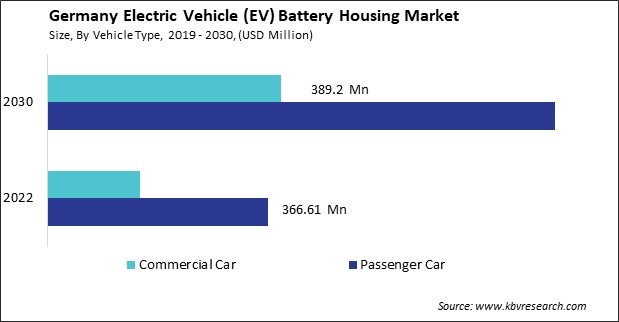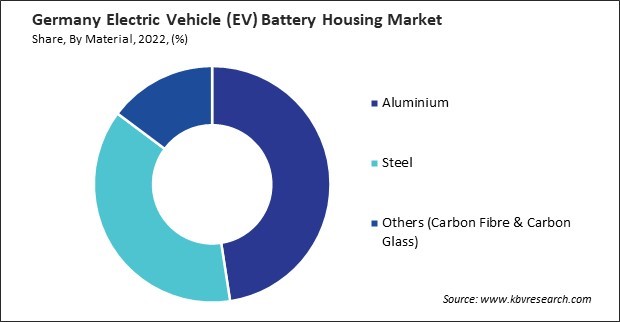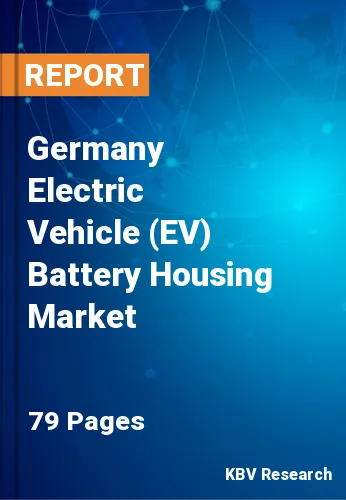The Germany Electric Vehicle (EV) Battery Housing Market size is expected to reach $1.2 billion by 2030, rising at a market growth of 11.1% CAGR during the forecast period.
As a global hub for automotive manufacturing and technology, Germany has been at the forefront of the transition to electric mobility, with its automotive giants leading the way in EV development and production. The presence of major automotive manufacturers in Germany, such as Volkswagen, BMW, and Daimler, has led to significant investments in electric vehicle production. These companies have been expanding their electric vehicle portfolios and investing in developing new EV models requiring advanced battery systems and housing. This increased production of electric vehicles has created a higher demand for EV battery housing to support the growing number of EVs manufactured in the country.

Germany's automotive industry has been driving innovation in battery technology and manufacturing processes. The country is home to some of the world's leading battery technology companies and research institutions, which have been instrumental in developing advanced battery systems for electric vehicles. As battery technology continues to improve, the demand for specialized EV battery housing capable of accommodating these advanced battery systems has grown, further fueling the demand for EV battery housing.
Additionally, Germany's automotive industry strongly focuses on quality and engineering excellence, which has led to the development of high-performance EVs with advanced battery systems. These vehicles require robust and efficient battery housing solutions to ensure the safety and reliability of the battery packs. As a result, there has been a growing demand for high-quality EV battery housing that meets the stringent requirements of German automakers and their global customers.
Germany has experienced a rising demand for electric commercial vehicles, driven by various factors that have reshaped the transportation and logistics sectors. The evolving nature of urban logistics and delivery services has contributed to the rising demand for electric commercial vehicles. With the growth of e-commerce and last-mile delivery services, there is a greater need for environmentally friendly and efficient vehicles that can easily navigate urban environments. Electric commercial vehicles are well-suited to meet these demands with their low emissions and quiet operation. They are increasingly being adopted by logistics companies and delivery services operating in urban areas.
In addition to environmental concerns, EVs' total cost of ownership (TCO) has become increasingly competitive compared to traditional diesel vehicles. Lower operating costs, including reduced fuel and maintenance expenses, have made EVs attractive for businesses looking to lower their operational expenses over the vehicle's lifecycle. As a result, many businesses in Germany are turning to electric commercial vehicles as a cost-effective and environmentally friendly alternative to traditional diesel-powered fleets. As businesses increasingly adopt electric fleets to reduce emissions and operating costs, the demand for high-quality EV battery housing has surged, creating opportunities for manufacturers and suppliers in the EV battery housing market.
Germany has incorporated measures in its COVID-19 recovery plans that have consequential effects on consumer sentiment. As an integral component of a substantial $146 billion economic recovery initiative, Germany has allocated $2.8 billion to enhance electric vehicle (EV) charging infrastructure. Furthermore, the government has unveiled new legislation mandating all fuel stations to install EV charging points. These strategic moves reflect a commitment to sustainable transportation and signal a broader shift towards electrification. As a result, these developments are poised to influence the growth and dynamics of Germany's electric vehicle battery housing market.
The material's proven track record in the automotive sector is a key reason for the rising demand for steel EV battery housing in Germany. Steel has long been a staple material in automotive manufacturing due to its high strength, durability, and ability to withstand impact and deformation. These properties make it an ideal choice for EV battery housing, where safety, reliability, and structural integrity are paramount. Moreover, steel is relatively affordable and widely available, making it a cost-efficient choice for large-scale production in the automotive industry. This cost advantage is particularly significant for German manufacturers seeking durable and economical solutions for their electric vehicles, especially in commercial and heavy-duty applications.
Additionally, advancements in steel manufacturing techniques, such as advanced high-strength steel (AHSS) and tailored blanks, have further enhanced the suitability of steel for EV battery housing. These advancements allow for the production of complex shapes and structures with optimized strength and weight characteristics, enabling manufacturers to design lightweight yet robust battery housing solutions that meet the stringent requirements of electric vehicles. Thus, as Germany continues to adopt electric mobility, steel is expected to remain a popular choice for EV battery housing, especially in applications where safety, reliability, and cost efficiency are critical considerations.

In the German electric vehicle (EV) battery housing market, several companies are involved in developing, producing, and supplying battery housing solutions for EVs. These companies play crucial roles in advancing the EV industry in Germany and beyond. Some notable companies in this industry include Volkswagen Group, BMW Group, Daimler AG (Mercedes-Benz), Akasol AG, Varta AG, Northvolt GmbH, ElringKlinger AG, Webasto Group, Leoni AG, ThyssenKrupp Steel Europe AG, KIRCHHOFF Automotive GmbH, BENTELER Automotive, ZF Friedrichshafen AG, etc.
One of the key players in the German EV battery housing market is Thyssenkrupp, a diversified industrial conglomerate with a strong presence in the automotive sector. Thyssenkrupp is known for its expertise in steel and metal manufacturing, including the production of advanced materials used in EV battery housing. The company's focus on innovation and sustainability has positioned it as a leading supplier of battery housing solutions for electric vehicles in Germany.
Another prominent company in the German EV battery housing market is EDAG Engineering, a leading provider of engineering services to the automotive industry. EDAG specializes in designing and developing vehicle components, including battery housing systems for electric vehicles. The company's expertise in vehicle engineering and its focus on electric mobility has made it a key player in the German for EV battery housing market.
Moreover, companies like ElringKlinger AG have a significant presence in the German EV battery housing market. ElringKlinger is a global automotive supplier specializing in sealing and shielding technology, including components for electric vehicles. The company has been actively involved in developing battery housing solutions that meet the stringent requirements of electric vehicle manufacturers in Germany and worldwide.
Additionally, established automotive manufacturers such as Volkswagen, BMW, and Daimler have invested heavily in electric vehicle development, including battery electric vehicles (BEVs) and plug-in hybrid electric vehicles (PHEVs). These companies have research and development facilities that advance EV technology, including battery housing solutions tailored to their specific vehicle platforms.
Another major player in the German EV battery housing market is Volkswagen Group, one of the world's largest automotive manufacturers. Volkswagen has been actively investing in electric mobility and has developed its modular electric drive matrix (MEB) platform for electric vehicles. As part of its electric vehicle strategy, Volkswagen has been developing innovative battery housing solutions that meet the specific requirements of its electric vehicle lineup, contributing to the advancement of the EV battery housing market in Germany.
Furthermore, specialized companies like Webasto Group, a global systems partner to the automotive industry, have been expanding their offerings to include battery systems and components for electric vehicles. Webasto's expertise in thermal management systems has positioned it as a key player in the EV battery housing solutions market, particularly in managing battery temperature and performance.
These companies, among others, form a robust ecosystem of suppliers and manufacturers that support developing and producing EV battery housing solutions in Germany. Their expertise in materials, manufacturing processes, and automotive technology contributes to the advancement of electric mobility and the expansion of the EV market in the country.
By Vehicle Type
By Material
Our team of dedicated experts can provide you with attractive expansion opportunities for your business.

